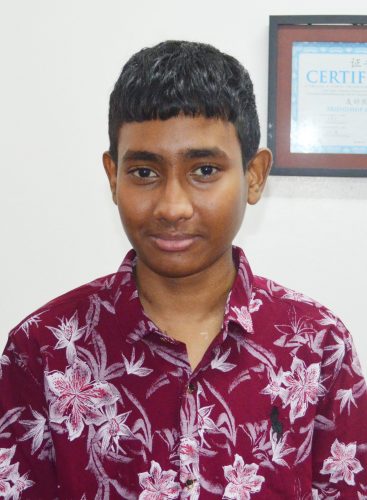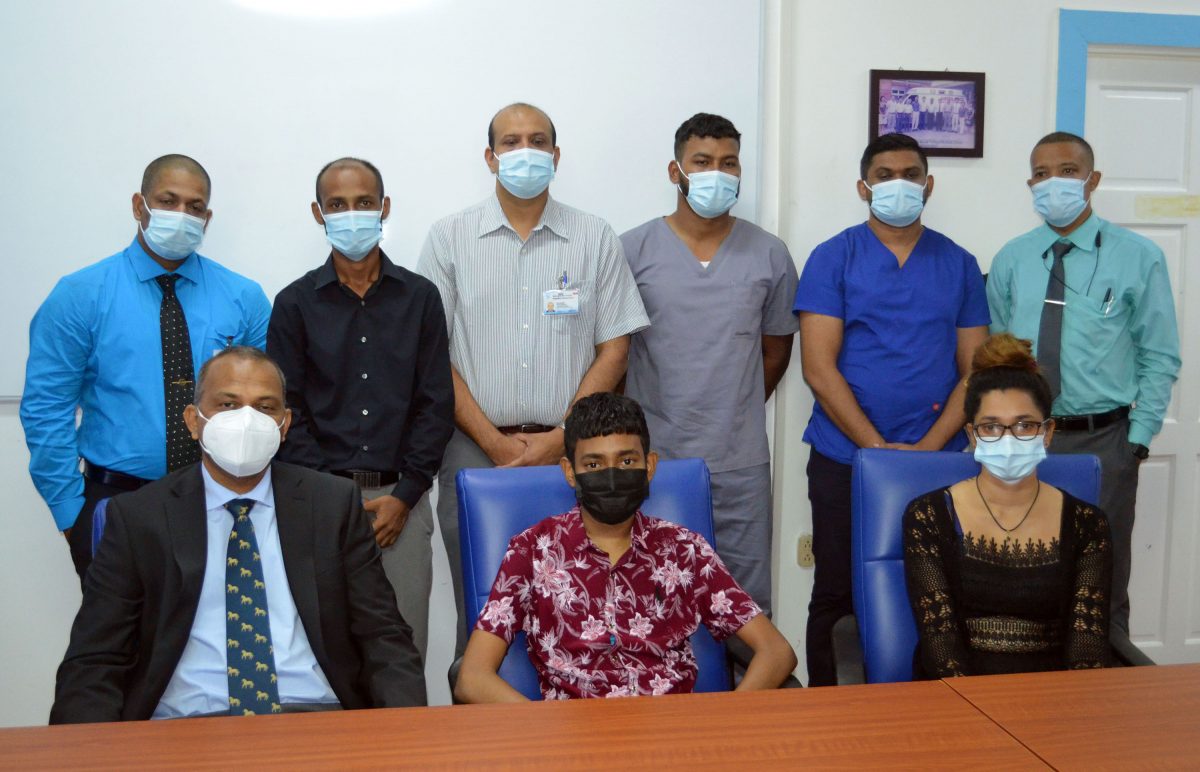Fifteen-year-old Aditya Mohabir is expected to be able to live a normal life again after a successful kidney transplant, which was made possible when his mother volunteered to be his donor.
The surgery was performed on February 8th at the Georgetown Public Hospital (GPH) by a team of doctors led by Head of the Multi-Organ Transplant and Vascular Access Surgery Department Dr Kishore Persaud.
To date, a total of 31 kidney transplants were successfully completed at the facility.

Mohabir has since been discharged and has been reunited with his family.
The kidney can last approximately 20 to 25 years once he follows all of the doctor’s instructions and comply with medication.
Kidney failure, also called end-stage renal disease, is the last stage of chronic kidney disease.
According to the Mayo Clinic website, acute kidney failure occurs when the kidney suddenly becomes unable to filter waste products from the blood.
Mohabir, 15 of Vriesland, West Bank Demerara was diagnosed with kidney failure in late August, 2020, shortly after he fell ill. Over time, Mohabir’s condition worsened and he was transferred to the GPH, where it was confirmed that he was suffering from kidney failure.
As a result, doctors had recommended dialysis treatment for Mohabir, which he subsequently started to receive.
Shortly after the dialysis, Budwah learned that Mohabir would need a transplant in order to survive. She decided to donate hers.
Weeks after, she was able to confirm via testing that she will be able to provide the kidney for her son’s transplant.
At a press conference held on Friday, Dr Persaud told reporters that Mohabir will be able to live a normal life again. “He will not need dialysis once he follows all instructions. So he does not need dialysis anymore. That financial burden is taken away from them,” he said.
“He can go back to school, he can learn a trade, he can work and can even help to support his family….It also helps our health care system because he will not be requiring a bed in the hospital. He will not be turning up here frequently for medication because the amount of medication that is required to sustain him is very minimal, it’s affordable and it will keep him healthy,” Dr Persaud explained.
Speaking to reporters following the press conference, Budwah searched for words as she tried to express how grateful she was that her son was given a new lease in life.
“I felt great because I know to myself I am doing something good… for Aditya. I have no words, words cannot explain right now but I am feeling so excited and happy to go back to my normal life. And speaking on behalf of him, he’s excited because he can’t wait to go home and show people what he went through and now he get back a normal life. He’s proud to show up right now,” she related.
She encouraged other persons to set their fear aside and also donate in order to save a life.
“I think people out there should not be afraid to be a donor. They should come forward and be a donor. Support your family or friend or whoever need a kidney. Don’t be scared. Actually I am feeling proud right now and I am happy that Aditya can go back to his normal life and I can go back to my normal life as well. I am happy,” Budwah noted.
Dialysis
According to Dr Persaud, the GPH currently does not have a renal registry. However, from observation, he estimates that the institution has over 150 patients throughout the country accessing dialysis.
Out of the number, 75% of these patients are in need of a transplant but do not have donors.
Minister of Health Dr Frank Anthony, who also spoke, admitted that dialysis treatment can be expensive.
He explained that there are a number of facilities that offer the service but while they have worked to reduce the cost in the past, this remains a challenge for patients, especially those who are uninsured.
“So dialysis, while it’s available, it is sometimes even at the rate that we are offering at, it is sometimes a very costly endeavour, especially if you have to do it for a protracted period,” Anthony said.
He related that there are also other related factors which cause a strain on such patients, such as the cost of medication. “Many patients who are on dialysis would have to receive special medication and these two are all often very expensive,” Anthony said.
In light of this, he said that the ministry is working with dialysis providers across the country to determine what measures can be taken to reduce the cost and standardise the care patients receive.
Thus far, he said they have engaged “almost all” of the providers of dialysis in Guyana so that the quality can be lifted.
Legislation
Additionally, Dr Persaud said that there are thousands of patients who are “desperate” for such a surgery.
In order to help the situation, he said authorities are aiming towards the implementation and passage of an Organ Transplant bill. This bill is expected to be presented in Parliament in May, 2021.
“We are working feverishly to have that legislation,” Dr Persaud said.
To this end, Anthony said that while transplants are being done in Guyana, the country does not have the legislation in place.
Over the last two months, he said a team of doctors, including Dr Persaud, have been meeting to put together new legislation.
“And once we get that draft, we will be able to take it through its paces of consultations so that we can hopefully by the end of this year, have such legislation in place so as to make sure that this legal framework for transplants are properly in place,” he added.
He said this is necessary “because we need to have rules that guide people who can donate, we need to have rules about how people can receive and also to make sure that these procedures are properly covered legalistically.”





